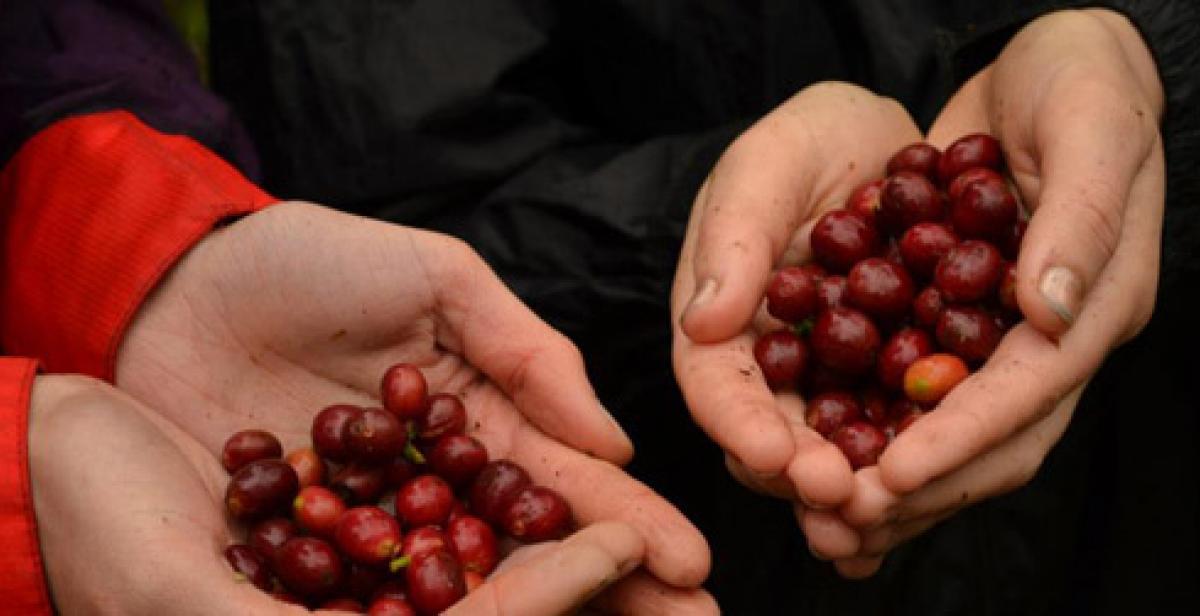The beauty of Nicaragua’s northwest highlands was appreciated all the more after the week long training in bustling Managua. As the wheels of the American school bus sped us towards Las Manos we glimpsed canyons and peaks, snaking rivers and valleys. Further north, the scenery fast becomes hilly and forested, and the cooler temperatures nourish a very different landscape. Banana trees and pine swayed together in a curious union as we reached the dramatic slopes of Dipilto. I was elated. The high altitudes, breezy climate and rich volcanic soil combine to create perfect growing conditions of my all time (any time) favourite drink: coffee.
In Las Manos, ‘el café’ is abundant. Small red coffee bushes dot the path up to my host family’s house, and larger plantations famously envelop the wider terrain. Our first weekend was spent exploring the area, and to my caffeine crazed delight our group had the opportunity to visit a locally run coffee processing company.
Café el Negrito is nestled part way up a mountain and the aroma of roasting beans lingers in the air. Coffee was the hot topic on our lips and we were lucky enough to chance an interview with Samuel Zavala, the son of the coffee plantation owner.
Soon to inherit his father’s business, Samuel has been working on the family-run production since the age of eight, and he knows the industry from the inside out. He was keen to explain how integral coffee is to his life and his local community, and also talk about the problems he and other coffee producers are facing in recent years.
He told us that between December and March, coffee takes centre stage and life here revolves completely around the harvest.
“It’s coffee picking season right now. Everyone here is either picking coffee or trying to sell it. It generates the most income of the year for families in this area. And the next nine months of the year is generally spent in the coffee plantations trying to cultivate the coffee cherries to the highest quality so they’re ready for December.”
At the entrance of the coffee house we noticed framed awards proudly displayed on the walls. Café el Negrito frequently boasts superior quality coffee and makes a regular appearance in the ‘quality coffee top-twenty’ national awards. Samuel explained to us how each batch is painstakingly taste-tested.
“We define the ‘good’ and ‘bad’ quality coffee by a system of coffee tasting. The quality we produce is very high. It’s a matter of prestige to have good quality coffee”.
Our tastebuds unanimously agreed when we sampled a fresh batch.
However, despite producing and exporting superior quality beans worldwide from Tokyo to London, coffee is a demanding crop and he runs a high risk business. Warmer temperatures, erratic rainfall and deforestation threaten his cultivated species, and a devastating disease called ‘rolla’ is currently taking an enormous toll on coffee harvests across Nicaragua. He described how, in recent years, the business has become more expensive to run.
“The cost of producing coffee has risen by 20%, because of the increased cost of chemicals to treat the soil and plants of disease. Prices have skyrocketed and it’s really affecting business. Last year, rolla reduced our coffee production by two thirds. We are still trying to recuperate our losses by selling the coffee at twice the market price, but it has hit us badly.”
Even so, Samuel has faith in his business and is hopeful for the future.
“Places like Japan still buy at the higher price because demand for good quality coffee is high. And we are trying to implement more organic methods of farming so we are less reliant on harsh and expensive chemicals. Coffee is central to our community here in Las Manos, and it is our biggest source of income”.
Nicaragua’s economy is traditionally based in agriculture, and along with bananas and tobacco, coffee is a chief export. However, speaking to Samuel showed us that coffee is not just merely a commodity to sell. In small communities like Las Manos, daily life revolves around it. Generally drank sweetened and without milk, coffee kick-starts the day; and the working year revolves around its harvest season. It brings an industry to the area, an income to families and a warmth to chillier mornings. Coffee cultivation has also been proven to help sustain natural ecosystems and ease soil erosion. After my first week here I have a newfound respect for my favourite beverage. Coffee is the economic backbone for rural communities like Las Manos, and a centrepiece at heart of Nicaraguan culture.
Sharon Natt, UK volunteer in Nicaragua



